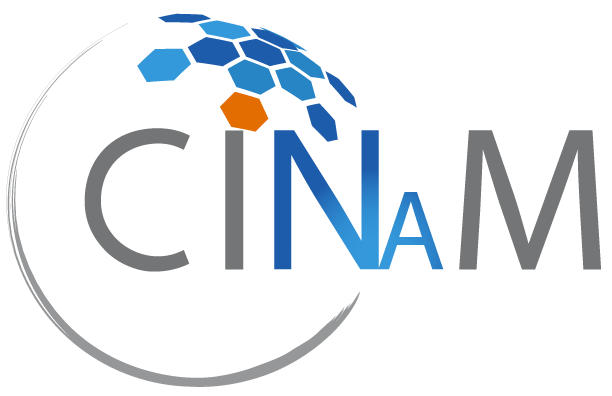This research topic is integrated into the CINaM’s themes by dealing with the synthesis and properties of nanometric materials such as nanoparticles, aggregates, nanotubes and molecules, in interaction with their environment.
A first research direction concerns the modelling of material kinetics, and more particularly the selective synthesis of carbon nanotubes.
A second research direction consists in modelling and characterizing the structure, morphology and chemical order (phase diagrams) of metallic alloy nanoparticles or “Nanoalloys” in relation to their properties in catalysis, plasmonics and magnetism.
2026
Vacancy-Driven Twinning in Metal Nanoparticles: From Bulk Morphology Transformation to Optical and Electrochemical Effects
Ilia Smirnov, Zbigniew Antoni Kaszkur, Mohit Chaudhary, Hans-Christian Weissker, Riccardo Ferrando, Pawel Kulesza
Nanoscale (2026)10.1039/D5NR04865F
2025
Activation entropy of dislocation glide in body-centered cubic metals from atomistic simulations
Arnaud Allera, Thomas D Swinburne, Alexandra M Goryaeva, Baptiste Bienvenu, Fabienne Ribeiro, Michel Perez, Mihai-Cosmin Marinica, David Rodney
Nature Communications 16:8367 (2025)10.1038/s41467-025-62390-w
Mass transport and structural transformations in core@shell Cu@Ni nanoparticles
Luca Benzi, Diana Nelli, Christine Mottet, Riccardo Ferrando
Journal of Alloys and Compounds 1044:184280 (2025)10.1016/j.jallcom.2025.184280
The 2025 Roadmap to Ultrafast Dynamics: Frontiers of Theoretical and Computational Modelling
Fabio Caruso, Michael Sentef, Claudio Attaccalite, Michael Bonitz, Claudia Draxl, Umberto de Giovannini, Martin Eckstein, Ralph Ernstorfer, Michael Fechner, Myrta Grüning, Hannes Hübener, Jan-Philip Joost, Dominik Maximilian Juraschek, Christoph Karrasch, Dante Marvin Kennes, Simone Latini, I-Te Lu, Ofer Neufeld, Enrico Perfetto, Laurenz Rettig, Ronaldo Rodrigues Pela, Angel Rubio, Joseph Rudzinski, Michael Ruggenthaler, Davide Sangalli, Michael Schüler, Samuel Shallcross, Sangeeta Sharma, Gianluca Stefanucci, Phillip Werner
Journal of Physics: Materials 9:012501 (2025)10.1088/2515-7639/ae1165
Vacancy-induced omega phase fluctuations in body-centered cubic Ti and Zr
Sally Issa, Guy Tréglia, Hakim Amara, Céline Varvenne
Computational Materials Science 260 (2025)10.1016/j.commatsci.2025.114251
vacancy-induced omega phase fluctuations in body-centered cubic Ti and Zr
Sally Issa, Guy Tréglia, Hakim Amara, Céline Varvenne
Computational Materials Science 260:114251 (2025)10.1016/j.commatsci.2025.114251
Anomalous self-diffusion in tungsten and molybdenum: Exonerating the di-vacancy contribution and the key role of interatomic interaction
Clovis Lapointe, Anruo Zhong, Thomas Swinburne, Fabien Bruneval, Manuel Athènes, Mihai-Cosmin Marinica
Physical Review Materials 9:093801 (2025)10.1103/c612-psgt
Exploring parameter dependence of atomic minima with implicit differentiation
Ivan Maliyov, Petr Grigorev, T D Swinburne
npj Computational Materials 11:22 (2025)10.1038/s41524-024-01506-0
Moiré amplification of highly tunable shift current response in twisted trilayer graphene
Yuncheng Mao, Claudio Attaccalite, Diego García Ovalle
Physical Review B 111:195408 (2025)10.1103/PhysRevB.111.195408
Shift current in 2D Janus Transition-Metal Dichalcogenides: the role of excitons
Yuncheng Mao, Ju Zhou, Myrta Grüning, Claudio Attaccalite
Physical Review B: Condensed Matter and Materials Physics (1998-2015) 9:124002 (2025)10.1103/qth8-6spb
Uncertainty quantification for misspecified machine learned interatomic potentials
Danny Perez, Aparna Subramanyam, Ivan Maliyov, Thomas Swinburne
npj Computational Materials 11:263 (2025)10.1038/s41524-025-01758-4
A real-time approach to frequency-mixing spectroscopies: application to sum and difference frequency generation in two-dimensional crystals
Mike N. Pionteck, Myrta Grüning, Simone Sanna, Claudio Attaccalite
SciPost Physics 129 (2025)10.21468/SciPostPhys.19.5.129
Parameter uncertainties for imperfect surrogate models in the low-noise regime
Thomas Swinburne, Danny Perez
Machine Learning: Science and Technology 6:015008 (2025)10.1088/2632-2153/ad9fce
2024
Size and shape effects on chemical ordering in Ni–Pt nanoalloys
Pamela Camilos, Céline Varvenne, Christine Mottet
Physical Chemistry Chemical Physics 26:15192-15204 (2024)10.1039/D4CP00979G
Optical spectra of silver clusters and nanoparticles from 4 to 923 atoms from the TDDFT+U method
Mohit Chaudhary, Hans-Christian Weissker
Nature Communications 15:9225 (2024)10.1038/s41467-024-53428-6
Sampling-free computation of finite temperature material properties in isochoric and isobaric ensembles using the mean-field anharmonic bond model
Raynol Dsouza, Marvin Poul, Liam Huber, Thomas Swinburne, Jörg Neugebauer
Physical Review B 109:064108 (2024)10.1103/PhysRevB.109.064108
Insights on the capabilities and improvement ability of classical many-body potentials: Application to α -zirconium
Alessandra del Masto, Jean Baccou, Guy Tréglia, Fabienne Ribeiro, Céline Varvenne
Computational Materials Science 231:112544 (2024)10.1016/j.commatsci.2023.112544
Tunable second harmonic generation in 2D materials: comparison of different strategies
Simone Grillo, Elena Cannuccia, Maurizia Palummo, Olivia Pulci, Claudio Attaccalite
SciPost Physics Core 7:081 (2024)10.21468/SciPostPhysCore.7.4.081
Pressure and temperature diagram of C60 from atomistic simulations
Karim Hakim, Romain Dupuis, Christophe Bichara, R.-J.-M. Pellenq
The Journal of Chemical Physics 161 (2024)10.1063/5.0213022
Dynamics of growing carbon nanotube interfaces probed by machine learning-enabled molecular simulations
Daniel Hedman, Ben Mclean, Christophe Bichara, Shigeo Maruyama, J. Andreas Larsson, Feng Ding
Nature Communications 15:4076 (2024)10.1038/s41467-024-47999-7
Dynamics of growing carbon nanotube interfaces probed by machine learningenabled molecular simulations
Daniel Hedman, Ben Mclean, Christophe Bichara, Shigeo Maruyama, J. Andreas Larsson, Feng Ding
Nature Communications 15:4076 (2024)10.1038/s41467-024-47999-7
Temperature dependence of generalized stacking fault free energy profiles and dissociation mechanisms of slip systems in Mg
Reza Namakian, Dorel Moldovan, T D Swinburne
Computational Materials Science 231:112569 (2024)10.1016/j.commatsci.2023.112569
Reply to Lee and Elliott: Changes of bonding upon crystallization in phase change materials
Jean-Yves Raty, Christophe Bichara, Carl-Friedrich Schön, Carlo Gatti, Matthias Wuttig
Proceedings of the National Academy of Sciences of the United States of America 121 (2024)10.1073/pnas.2405294121
Tailoring chemical bonds to design unconventional glasses
Jean-Yves Raty, Christophe Bichara, Carl-Friedrich Schön, Carlo Gatti, Matthias Wuttig
Proceedings of the National Academy of Sciences of the United States of America 121 (2024)10.1073/pnas.2316498121
ParSplice: strong exa-scaling of molecular dynamics
T D Swinburne
KIM REVIEW (2024)10.25950/2f54b682
Optical Properties of AgAu Alloy Clusters: Effect of Chemical Configuration along a Rearrangement Pathway
Hans-Christian Weissker, Florent Calvo
Alloys 3:31-42 (2024)10.3390/alloys3010003
2023
Swinging Crystal Edge of Growing Carbon Nanotubes
Georg Daniel Förster, Vladimir Pimonov, Huy-Nam Tran, Saïd Tahir, Vincent Jourdain, Christophe Bichara
ACS Nano 17:7135-7144 (2023)10.1021/acsnano.2c07388
Pressure Dependence of Electronic, Vibrational and Optical Properties of wurtzite-Boron Nitride
Martino Silvetti, Claudio Attaccalite, Elena Cannuccia
Physical Review Materials 7:055201 (2023)10.1103/PhysRevMaterials.7.055201
Visualizing screening in noble-metal clusters: static vs. dynamic
Rajarshi Sinha-Roy, Pablo García-González, Xóchitl López-Lozano, Hans-Christian Weissker
Physical Chemistry Chemical Physics 25:2075-2083 (2023)10.1039/D2CP04316E










